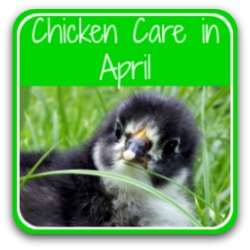- Home
- Plants for Chickens
- Lavender
Lavender aromatherapy for chickens.
If you want laid-back, healthy hens, bug control in the coop and a pretty run, you can't go wrong with lavender. Here's why.
Let me be honest. I've written this article because I love lavender and use it as a relaxing aromatherapy oil for myself.
I grow it in our garden in Italy and in my chicken run, and I hang bunches of it both in our house and in the chicken coop.
There's no actual scientific research (that I'm aware of) about the medicinal benefits of lavender for chickens. There's a lot of anecdotal information on the internet singing its praises.
And it's known to be a gentle herb which won't harm your chickens, even if they eat it.
Herbs can be a great addition to the holistic treatment of your chickens' health. As long as you don't believe that your chickens can be cured of virtually any ailment with herbs alone, you won't go far wrong.
So here's what's good about lavender as far as I - and my chickens - am concerned.
If you purchase a product through links on this page, I receive a small commission at no extra cost to you. I only recommend products I have purchased or would purchase myself and which I believe would benefit you. To learn more please see my disclosure policy.
Lavender aromatherapy for chickens: relaxation.
In humans, fairly extensive research has shown that the smell of lavender can lower the heart rate and reduce blood pressure(1).
There have also been tests on rats which show that being exposed to its oil for seven consecutive days substantially reduced anxiety.(2) Similar research on mice and rabbits with both the oil and dried flower buds have produced the same results(3).
There haven't been any tests performed on the effects of lavender on chickens, but given its calming effects across the broad spectrum of other creatures, it's probably right to say that it can help calm chickens, too.
At the very least, it will do no harm.
How to use lavender to make nest boxes relaxing and broody hens fall asleep!
Hens dislike noise and prefer to be undisturbed and relaxed as they lay, so may appreciate an occasional touch of lavender in their nest boxes (although be aware - I've seen it occasionally send them to sleep in the middle of laying!).
Broody hens too will appreciate a bit of calm and relaxation as they hatch and then care for their chicks.

The majority of research has been done using lavender oil, which is extracted from the flower buds. Be careful when using concentrated aromatherapy oils - sprinkle a couple of drops (no more!) on nest-box bedding, but make sure it's mixed in thoroughly.
I occasionally put a few drops in a carrier oil (like sunflower) on a saucer on the window ledge above the nest area (I do not heat it), but more commonly I will add dried lavender buds like these to the bedding (click the photo to buy from Amazon if you don't have your own).
Don't use fresh herbs in nest boxes unless you're prepared to refresh them every couple of days. They can go mouldy and cause the bedding to become infected and smell - but not in a good way.
Lavender aromatherapy: calming aggression.
Lavender research with mice has found that it is able to calm aggression(4). This goes hand-in-hand with its effects of calming the central nervous system: a less heightened, more relaxed, state of awareness is bound to follow.
Will it calm an aggressive rooster?
The evidence is that aromatherapy effects are not particularly long-lasting. So while an aggressive roo may become more mellow when he's in the immediate vicinity of lavender, it's unlikely that he would remain that way once outside the coop.
It's worth a try, but don't expect it to stop that rooster from attacking you if that's what his hormones are telling him to do. Sometimes, the only thing to do with a roo like that is re-home.
How to use lavender in the roost - and why to be careful about using fresh herbs in bedding.
 I hang bunches of fresh lavender from the rafters. It looks and smells amazing!
I hang bunches of fresh lavender from the rafters. It looks and smells amazing!If you'd like to try lavender's calming effects in the main roost, sprinkle some dried buds in whichever type of bedding you use.
Again, be careful about using fresh herbs in bedding - it will rot unless you change it very regularly.
Alternatively, hang some bunches of fresh lavender around your coop. That's what I do and, if nothing else, it makes the place smell wonderful!
Growing and drying your own lavender isn't hard providing you have the right conditions. Try it - it will save you a lot of money in the long run.
And stepping out to the sight and sound of lavender in your garden will give you huge pleasure into the bargain!
The benefits of lavender oil for healing wounds.
Medical research has evidenced the antibacterial value of essential oils(5), tea tree being the most potent and lavender, along with peppermint and thyme, coming a close second. Tea tree oil, in fact, was found to be effective in combatting bacteria as powerful as MRSA.
So it follows that using a combination of tea tree and lavender oil for any kind of chicken wounds can help.
How to use lavender in oil form as a powerful antiseptic.
In a bowl, add 2 cups of warm water (use bottled if your tap water has a lot of chemicals), then 5 drops of lavender oil...
and 2 drops of tea tree.
Use cotton wool or a cotton bud to apply the liquid to the wound.
Never use essential oils near your chicken's (or your!) ears, eyes or nose.
Lavender as an insect repellent.
Do you have a memory of your grandma's clothes smelling of lavender? That's because it's been used for many centuries as an insect repellent.
People in the know would hang sachets in wardrobes or place them among clothes and linen in drawers to keep moths away.
Chicken coops are notorious for attracting flies, especially in hot summer months. Personally, I dislike fly traps of any kind intensely - I once tried the "red top" and was physically sick.
Apart from the obvious ways to keep flies at bay - keeping bedding clean and dry, scooping poop daily, removing wet or unused food - lavender can help.
How to make your own lavender fly spray.
Growing some lavender bushes around the doors to your chicken coop can help. The chickens may try to eat it and that's fine - it's not harmful. Mine avoid it at all costs.
It's apparently quite a bitter taste (how does anyone know that!) and chickens are quite good at avoiding things that taste nasty.
Make your own spray: Mix 25 drops of lavender oil and the same of either grapefruit or eucalyptus oil...
...with 2 oz of water (distilled or bottled if possible) and 1.5 oz witch hazel - make sure it's scent- and alcohol-free.
Put into a spray bottle, shake before you use and spray liberally in your coop.
In conjunction with planting bushes and hanging bunches, it's a pretty effective bug deterrent - and a lovely, fresh smell.
- Home
- Plants for Chickens
- Lavender
So at the end of the day...
Whether you believe in using natural remedies for your flock is entirely a matter for you, of course. There is scientific evidence for the value of lavender, as evidenced here.
But it's not an answer to everything and, as ever, you must make your own decision about what's right for your flock.
I don't believe that lavender will cure all my chickens' ailments, and I may be deluded to think it even makes them relax! But it certainly doesn't hurt and my experience is that it has done some good.
Whatever your views, it definitely makes for a sweet-smelling coop - and a gorgeous-looking run.
And as a bonus - bees love it!

See some other plants beneficial to chickens in this short video.
If you liked this page, you may also find these useful.
Sources and further reading.
1. Houlivand, Pier, et al: Lavender and the nervous system. Pub. US National Library of Medicine, 2013.
2. Hritcu et al: Effects of lavender oil inhalation on improving scopolamine-induced spatial memory impairment in laboratory rats. Pub. Phytomedicine, 2012.
3. Buchbauer, G et al: Aromatherapy: evience for sedative effects of the essential oils of lavender after inhalation. Pub. Zeitschrift fur Naturforschung, 1991.
4. Linck, V.M. et al: Effects of inhaled linalool in anxiety, social interation and aggressive behaviour in mice. Pub. Phytomedicine, 2010.
5. Hartman, G. and Coetzee, J: Two US practitioners' experience of using essential oils for wound care. Pub. Journal of Wound Care, 2013.


















